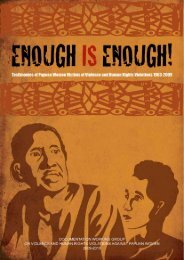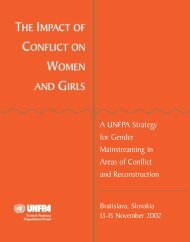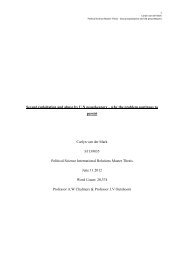Download the full report - Human Rights Watch
Download the full report - Human Rights Watch
Download the full report - Human Rights Watch
Create successful ePaper yourself
Turn your PDF publications into a flip-book with our unique Google optimized e-Paper software.
Aside from <strong>the</strong>ir direct criminal responsibility for crimes committed on <strong>the</strong> ground (for<br />
instance, by issuing orders that are executed by subordinates), commanders or o<strong>the</strong>r<br />
superiors may be guilty for failing to prevent or punish crimes committed by <strong>the</strong>ir<br />
subordinates. Command responsibility is an established principle of customary<br />
international humanitarian law and has been incorporated into <strong>the</strong> Rome Statute. 54<br />
Sri Lankan National Law<br />
Sri Lanka’s constitution guarantees fundamental human rights, including <strong>the</strong> right to life,<br />
liberty, and security of person, <strong>the</strong> right to a fair trial, and <strong>the</strong> prohibition of torture. 55<br />
However, national security legislation, including emergency provisions and <strong>the</strong> Prevention<br />
of Terrorism Act (PTA), has been in place intermittently since 1971. 56 Such emergency laws<br />
and regulations have been used to supersede constitutional guarantees.<br />
The constitution makes <strong>the</strong> Public Security Ordinance (PSO), introduced by <strong>the</strong> British<br />
colonial authorities in 1947, part of Sri Lankan law. 57 Section 5 of <strong>the</strong> PSO empowers <strong>the</strong><br />
executive to issue emergency regulations that may authorize detention of suspects without<br />
charge or trial; authorize entry, search, and seizure of property; amend any law (o<strong>the</strong>r than<br />
<strong>the</strong> Constitution) or suspend its operation; and create special courts to prosecute<br />
offenders, including under <strong>the</strong> emergency regulations <strong>the</strong>mselves.<br />
The PSO and emergency laws enacted by various Sri Lankan governments have been widely<br />
criticized by national and international legal experts for contradicting international human<br />
rights standards, and undermining <strong>the</strong> rights enshrined in Sri Lanka’s constitution. 58<br />
54<br />
ICRC, Customary International <strong>Human</strong>itarian Law, rule 153; Rome Statute, art. 28.<br />
55<br />
The Constitution of <strong>the</strong> Democratic Socialist Republic of Sri Lanka 1978 prohibits torture under chapter 3, article 11,<br />
providing that: “No person shall be subjected to torture or to cruel, inhuman or degrading treatment or punishment.”<br />
Article 11 is an entrenched safeguard and as such can only be amended with approval of a two-thirds majority of<br />
Members of Parliament or by a simple majority in a public referendum. The Constitution does not expressly recognize<br />
<strong>the</strong> right to life and, until 2003, this had significant implications for <strong>the</strong> prohibition of torture and o<strong>the</strong>r cruel,<br />
inhuman or degrading treatment or punishment. In 2003, however, <strong>the</strong> Sri Lankan Supreme Court inferred <strong>the</strong> right to<br />
life as flowing from article 13(4) of <strong>the</strong> Constitution, which provides that “no person shall be punished with death or<br />
imprisonment except by order of a competent court made in accordance with procedure established by law.”<br />
56<br />
The Sri Lankan Constitution in article 155 authorizes <strong>the</strong> president to issue emergency regulations<br />
“amending or suspending <strong>the</strong> operation of <strong>the</strong> provisions of any law, except <strong>the</strong> provisions of <strong>the</strong> Constitution.”<br />
57<br />
Ibid.<br />
58<br />
The emergency regulations have consistently deviated from international standards, such as <strong>the</strong> ICCPR and<br />
<strong>the</strong> Convention against Torture. Specifically, on <strong>the</strong>ir face and in practice <strong>the</strong> emergency regulations are in<br />
“WE WILL TEACH YOU A LESSON” 26




![IANSA [PDF, 2MB] - PeaceWomen](https://img.yumpu.com/25206379/1/190x123/iansa-pdf-2mb-peacewomen.jpg?quality=85)
![Commitments Sample [PDF, 93KB] - PeaceWomen](https://img.yumpu.com/25206331/1/190x245/commitments-sample-pdf-93kb-peacewomen.jpg?quality=85)










![A Toolkit for Advocacy and Action [PDF, 260KB] - Peace Women](https://img.yumpu.com/25205989/1/190x245/a-toolkit-for-advocacy-and-action-pdf-260kb-peace-women.jpg?quality=85)